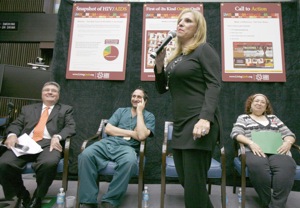-
- Barack Obama cruises to landslide victory in historical campaign
- Democrats expand House majority with broad gains
- Florida health officials launch HIV/AIDS Web site
- Same-sex marriages to begin this month in Connecticut
- Pathologist still has copy of lost Shepard autopsy
- National News Briefs
- World News Briefs
national
Florida health officials launch HIV/AIDS Web site
Campaign aims to better inform women about epidemic
Published Thursday, 06-Nov-2008 in issue 1089
MIAMI (AP) – When Julia Llorente was diagnosed with HIV in 1989, the stigma of the disease made her feel as if she had contracted leprosy.
When a pregnant Llorente went to her primary physician for a referral for a gynecologist, he wouldn’t touch her. She said she also faced pressure to get an abortion to spare her unborn child a life of illness.
Llorente, who now has a healthy HIV-free 18-year-old son, was one of the speakers at the Florida launch of a Web site on Oct. 30 at the University of Miami’s School of Medicine aimed at helping women get better informed about the disease. The Southern AIDS Living Quilt is part of a campaign to get women in the South tested.
Officials also hope it will begin dialogue to end the social bias against women who have the disease. The Web site was also launched in New Orleans and Raleigh, North Carolina.
“I hope that women will realize that we are much stronger than we give ourselves credit for,” Llorente said.
She said that she prayed to God to spare her child and when he was born on Dec. 1, which is World AIDS Day, she got her answer.
“To me he is my miracle child,” she said.
Now she is a grandmother of seven from her two older children and she is living with AIDS. She says although she has faith, she also made her final arrangements and paid for everything just in case.
“I was never a person to give up easily. I was always a fighter,” she said. “I had my times where I broke down and cried and wondered ‘Am I going to make it?’”
In Florida in 1997, women accounted for 27 percent of reported AIDS cases, according to data from the Centers for Disease Control and Prevention, the state Department of Health said. In 2007, that figure rose to 34 percent.
Currently, there are more than 25,000 women living with HIV/AIDS in Florida. More than 80 percent of these women are minorities.
Many black and Hispanic women face a lot of pressure and stigma, officials said. There are women afraid to take an HIV test.
“There are cultural issues. There are religious issues. There are all these caretaker issues,” said Thomas Liberti, chief of the Bureau of HIV/AIDS at the Florida Department of Health. “They will do anything to take their children to the doctor’s visit than take care of themselves.”
He said women might be reluctant to take their medication because they don’t want to carry their pills around, for fear of being discovered.
With the Web site “patients out there can see there are thousands of women in the South and in the country living with HIV diseases,” he said. “That you can go back to college, that you can go back to school. Just like any disease that you are diagnosed you will have ups and downs.”
About 1,600 people die of HIV/AIDS in Florida every year and the majority are black, officials said. That number has dropped from the peak years when about 4,000 people died, but it’s still too high, Liberti said.
“In 2008 this is just unacceptable. What were the barriers? Was it money, transportation ... stigma, a sense of hopelessness?” Liberti said. He is also on the board of the Southern AIDS Coalition which is launching the Web site.
The coalition is a nonprofit organization created in 2002 by community advocates, health officials in Southern states and others.
“The reason we are targeting to women in the South, when you look at new AIDS cases it represents the biggest disparities in the South,” Evelyn Foust, a coalition co-chair and Communicable Disease Director with North Carolina’s Division of Public Health, said in a telephone interview. “New AIDS cases are still overrepresented in the South.”
Tania Lopez, who is in charge of outreach for Hispanic women at the nonprofit Care Resource in Miami, said the Web site will help women, but not everyone has a computer and many of the people she sees are illegal immigrants who don’t know where to turn once they test positive.
She says everyone should heed her advice in order to never contract the disease.
“You have treat everyone like they are HIV-positive,” she said.
|
|
Copyright © 2003-2025 Uptown Publications


